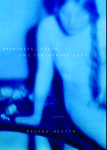|
|
 |
|
|
 |
 |
 |
 |
Brooks Haxton, born in Greenville, Mississippi, in 1950, is the son of the novelist Ellen Douglas and the composer Kenneth Haxton. He has published three previous collections of poetry, two book-length narrative poems, and two books of translations from the ancient Greek. The recipient of fellowships from the National Endowment for the Arts, the National Endowment for the Humanities, and the Guggenheim Foundation, Haxton teaches in the writing programs at Syracuse University and Warren Wilson College. He lives in Syracuse with his wife and three children.
Photo (c) Steven Weisberg
|
|
 |
 |
 |

|
The critically acclaimed poet and translator Brooks Haxton embraces life, from our naked beginnings to the first signs of middle age and beyond, in this inviting collection of poems. The book opens with the dramatic birth of twins, and speaks in the intimate voice of a husband, father, and poet. Diverse products of the imagination pass through Haxton’s generous mind—the mysterious number zero, Milton’s “Lycidas,” nuclear technology—even as he captures the humor and pathos of the everyday. In these brief, exquisite lyrics, meditations, and short stories in verse, he immerses his reader in the heat of teenage rivalry and friendship, the tender comedy of sex, and the amazements of the natural world. Here, from a book indelible in its language and feeling, are the last few lines:
My daughters my twin girls say Ba for bird
for book for bottle—Ba: in Egypt,
bird with a human head, the soul.
They wake and wake their mother. Ba!
They point into the dark. Ba, Ba! they say,
and back to nursing weary in her arms.
"These poems of Brooks Haxton's flash a sharp-edged light. Its tight focus swerves across some cosmic heights, and takes in stars, or roses, or the nightmare tale of a boy open-mouthed before his dentist/sadist. Haxton imagines it all into poignant language--even stabbing at answers to the haunted question: "What if the old love should return?"
--Marie Ponsot
|
|
 |
|
|
|
